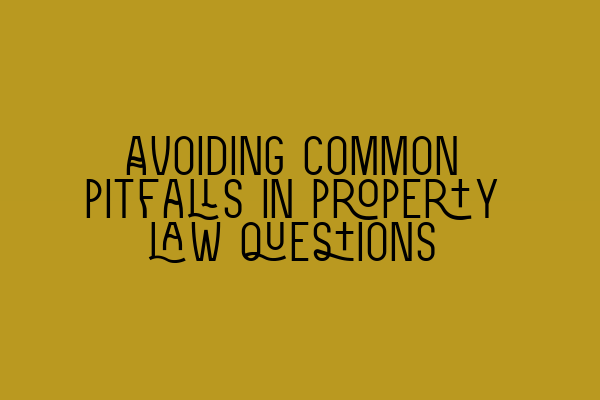Avoiding Common Pitfalls in Property Law Questions
When it comes to property law questions, there are a number of common pitfalls that many individuals fall into. These pitfalls can lead to costly mistakes and potential legal ramifications. As a solicitor with SQE Property Law & Land Law, I have encountered these pitfalls firsthand and understand the importance of navigating property law questions with precision and care.
In this article, I will outline some of the most common pitfalls in property law and provide tips on how to avoid them. Whether you are a law student preparing for the SQE exams or a property owner seeking legal advice, these insights will be valuable in ensuring a smooth and successful property law journey.
1. Lack of research and due diligence
One of the biggest mistakes individuals make in property law is a lack of research and due diligence. Whether it’s buying a property or drafting a lease agreement, thorough research is imperative. Understanding local laws and regulations, conducting property searches, and reviewing relevant documents are essential steps to ensure a successful property transaction.
To further enhance your knowledge and improve your chances of success in property law, I recommend exploring our SQE 1 Practice Exam Questions and SQE 1 Practice Mocks FLK1 FLK2 articles. These resources provide invaluable practice tools to test your knowledge and identify any areas for improvement.
2. Overlooking contractual obligations
Another common pitfall is overlooking contractual obligations. Property transactions often involve complex contracts that outline the rights and responsibilities of parties involved. Failing to abide by these contractual obligations can result in costly disputes and legal consequences.
To avoid this pitfall, it is crucial to carefully review and understand the terms of any contracts involved in a property transaction. Seek legal advice if necessary to ensure compliance and protect your interests. Our SQE Preparation Courses, both for SQE 1 and SQE 2, can provide you with comprehensive knowledge and insights to navigate contractual obligations with confidence.
3. Ignoring zoning and planning regulations
Zoning and planning regulations play a significant role in property law. Failure to adhere to these regulations can lead to issues such as building code violations or legal disputes with local authorities. Whether you are a property owner or a developer, it is essential to familiarize yourself with these regulations and obtain the necessary permits and approvals.
To enhance your understanding of zoning and planning regulations and their impact on property law, I recommend exploring our SQE 1 and SQE 2 Preparation Courses. These courses cover the necessary topics and provide practical advice for dealing with zoning and planning regulations.
4. Inadequate property valuation
Accurate property valuation is crucial in property transactions. Overvaluing or undervaluing a property can have significant financial implications. It is important to conduct thorough property valuations that take into account factors such as market conditions, property condition, and location.
To improve your property valuation skills, I recommend checking out our SQE Exam Dates article. Understanding the latest exam dates can help you plan your studies and ensure you are up to date with current property valuation practices.
5. Poor communication and documentation
Effective communication and documentation are vital in property law. Failing to communicate clearly with clients, counterparties, or third parties involved in a property transaction can lead to misunderstandings, delays, or even legal disputes. Additionally, properly documenting all agreements, negotiations, and transactions provides a strong legal foundation if any disputes arise.
To improve your communication and documentation skills, consider seeking guidance from our team at SQE Property Law & Land Law. We can provide valuable insights and assistance in navigating the intricacies of property law.
In conclusion, avoiding common pitfalls in property law questions is essential for success in this field. By conducting thorough research, understanding contractual obligations, adhering to zoning and planning regulations, practicing accurate property valuation, and maintaining effective communication and documentation, you can navigate property law questions with confidence.
To further enhance your knowledge and ensure your success in the SQE exams, I encourage you to explore our related articles on SQE preparation and exam dates. These resources can provide valuable practice tools and up-to-date information to help you excel in property law.
Remember, property law questions require attention to detail, a deep understanding of legal principles, and continuous learning. By avoiding common pitfalls and staying informed, you can navigate property law challenges and achieve your goals. Good luck on your property law journey!
